Don’t let anything ruin your ride. Try these positive actions to make the riding environment better. Simon Vincett shows you how.
Don’t grind your teeth at the bike-unfriendly things you come across as you pedal along. Take some action to help make bike riding easier and get back to whistling your way to work.
Get an app
From time to time, you’ll come across obstacles on your ride. You might be able to speak to the people involved or help resolve the issue yourself, or you might want to report the issue to the relevant authority. There are a few smartphone apps that allow you to report an obstacle easily, by leading you through a quick process to pinpoint the location, upload a photo, categorise the issue and report the context.
 Snap, Send, Solve is the best app in Australia because it directs your report straight to the authority responsible. For instance, if you’re within the City of Hobsons Bay, your email will go directly to that council. It prompts you to upload photos, then poses a few questions to describe the problem. The report is saved in your history for follow up.
Snap, Send, Solve is the best app in Australia because it directs your report straight to the authority responsible. For instance, if you’re within the City of Hobsons Bay, your email will go directly to that council. It prompts you to upload photos, then poses a few questions to describe the problem. The report is saved in your history for follow up.
The Bike Blackspot app was developed by the Australian Greens “to make life easier and safer for people to ride by highlighting chronic underinvestment in cycling infrastructure.” It promises to contribute to a database that the Greens can use to campaign for cycling infrastructure where it is needed: “When you log a report, your feedback is sent directly via email to your state transport minister, the federal transport minister and your Greens transport spokespeople at state and federal levels. Your report is also logged on the Bike Blackspot map.” An advantage of this app is that you can pinpoint a location without actually being there.
Bicycle Network’s Rider Log app offers an incident report function that delivers a message directly to Bicycle Network. Riders are prompted to add a photo as well. Bicycle Network uses the reports to inform campaigning to improve the riding environment.
Join the effort
Become part of making bike riding easier by joining Bicycle Network as a member. Your fees fund our campaigns to improve conditions for all bike riders, across Australia. As a health promotion charity, Bicycle Network delivers behaviour change programs such as Ride2Work and Ride2School, influences transport planning and lobbies all levels of government to increase active transport. Members also receive personal-injury insurance and support, alongside news and advice from experts via Ride On magazine and our fortnightly In the Loop. Find out more about membership.
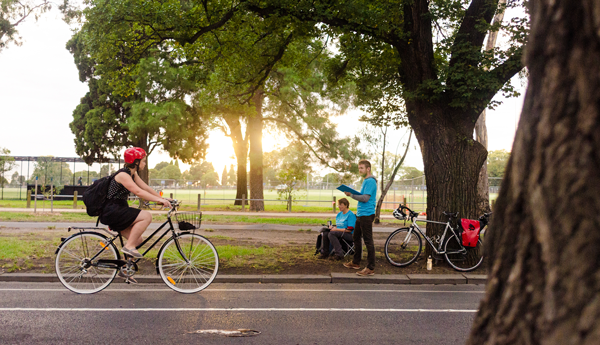
Additionally, you can volunteer your time to help Bicycle Network. Volunteers are a valued and vital part of Bicycle Network, enabling us to complete large-scale tasks such as the Super Tuesday and Super Sunday bike counts across Australia, that provide essential data for government to adequately plan for bike riders. Find out more about volunteering.
Help your local member
Contact your federal, state or local government representatives to thank them for helpful developments or to suggest improvements. Bicycle Network’s website has updates on the progress of many projects and position statements on many situations for your guidance. You will also find a list of ongoing campaigns to support.
The Take action page provides links to help you locate and contact your local members and councillors. It is very helpful to ongoing campaigning to copy Bicycle Network into your correspondence—[email protected].
When it comes to election time, you can find out which candidates are supportive of bike riding by following Bicycle Network’s VoteBike campaign. Each candidate is canvassed on their position on making bike riding easier and their responses are tabulated for the consideration of voters. VoteBike also identifies the major bike riding issues in the electorate and states Bicycle Network’s position.
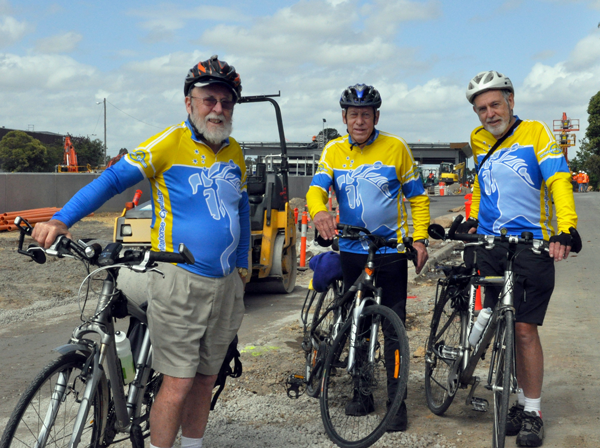
Get it in the media
Write to the local or the Metro newspaper or call talkback radio. When you see the council or state government doing something good for bikes, send a positive message. That’ll surprise everyone! If a discussion starts in the paper, on radio or in social media, have your say and keep it positive. Negative letters are unlikely to change anyone’s mind but they could make the spectators think that bike riders are unreasonable. Positive letters, on the other hand, have the opposite effect.
Bicycle Network members can nominate to be contacted by the media to speak about issues. They do so via the personal profile settings when logged in to the member area of the Bicycle Network website. The media often want to contact a person in a particular area, so Bicycle Network frequently receives requests of interview subjects and liaises with member who have nominated themselves.
Talk the ride–ride the talk
It’s pretty obvious that bike riding is good fun. Many people would like to ride but don’t know how to get started, so look for opportunities to be a riding buddy and invite someone to come for a pedal with you. An off-road route over a short distance would be an encouraging start for them. The process might also involve helping to find a bike for them or to go with them when they are looking at bikes.
To help people with skills and riding confidence, many councils offer bike training courses. Search their websites for details. There are also commercial businesses that offer skills and traffic confidence courses, including the very basics of learning to ride from scratch. Internet searching should turn up providers in your area.
In fact, you can become a cycle coach yourself. AustCycle offers a national accreditation program to become an instructor of cycling skills from learning to ride through riding in traffic confidence to advanced skills in road cycling, track, mountain biking and BMX.
Get them riding early
Riding to school is a massive opportunity for physical activity for kids but most kids aren’t doing it—or getting enough physical activity to be healthy. Bicycle Network’s Ride2School program provides a suite of tools and resources to break down the barriers and get the healthy habits happening.
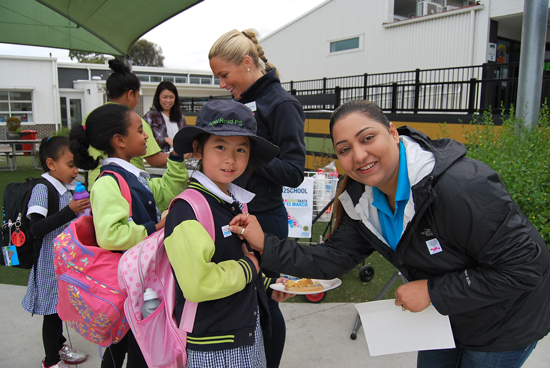
You can make Ride2School possible at your local school, whether it’s as a contact and administrator, as a trainer (following qualification with AustCycle or as a Bike Ed provider in Victoria) or as an assistant trainer. Contact your local school and Ride2School to get this happening.
Work on your workplace
Start encouraging your colleagues to ride to work by celebrating Ride2Work Day. It starts with organising a breakfast for riders on National Ride2Work Day hosted by your workplace. Your employer will love it because people who ride to work are more alert and have fewer sick days. Visit Ride2Work for resources and advice for staging a breakfast on this fun day of celebration.
Showers, lockers and secure bike parking encourage people to ride to work, so make a case for them as well. The Bike Parking Experts can assess, design and install all the bike facilities you need.
Why not become the workplace coordinator for the Ride2Work program and keep encouraging your workmates to ride throughout the year? Sign on via the Ride2Work website when you register as an individual as a rider on Ride2Work Day.
Bring together other people in your workplace who are enthusiastic about riding by forming a workplace BUG (Bicycle User Group). The BUG can meet regularly and divide up the tasks of campaigning for better facilities, staging Ride2Work Day breakfasts, planning social events and organising info sessions, such as bike maintenance courses. Bicycle Network has a guide to setting up a workplace BUG.
Join the club
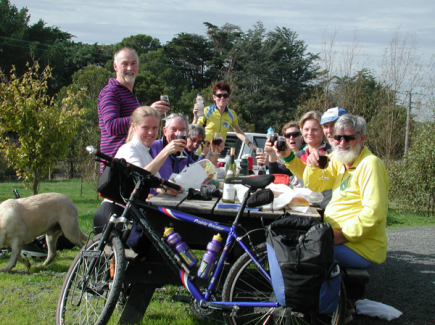
As well as the workplace variety, BUGs are commonly found throughout the suburbs of cities and towns as the bike group for the local area. Also existing as clubs, these groups of riding enthusiasts have a schedule of regular local rides with some longer excursions as well, sometimes overseas. The group often organises a discount at a favourite bike shop, arranges bike maintenance and skills courses at a special price for members, and stages social events such as BBQs and a Christmas party.
In addition to riding and socialising, BUGs are often keen to lobby for the improvement of local riding conditions. The most influential BUGs and clubs in this regard are those with the most members, hence the importance of the social aspect to gain and keep members. Most members won’t want to be directly involved in the campaigning but their numbers will give the group some weight to make a difference.
BUG and club members can also contribute by volunteering for the Super Tuesday and Super Sunday bike counts. Each volunteer’s count earns $50 from Bicycle Network for their nominated group.
Find a BUG or club near you.
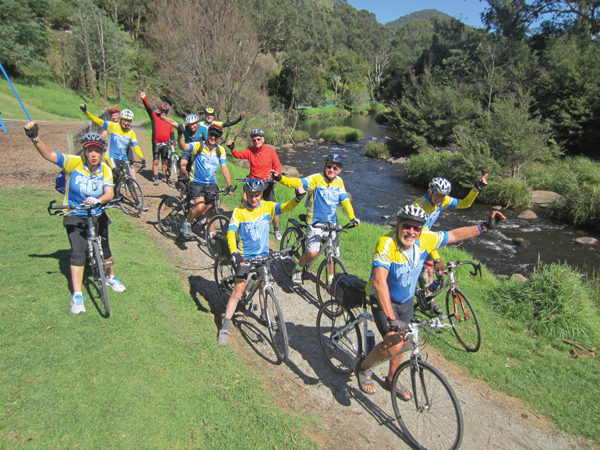
Ride On content is editorially independent, but is supported financially by members of Bicycle Network. If you enjoy our articles and want to support the future publication of high-quality content, please consider helping out by becoming a member.

G’day Simon.
Might be good to also mention that some Councils, like Whitehorse, have Bicycle Advisory Committees which are Citizens Committees that operate at the Collaboration level of the Community Engagement Spectrum as adopted by the International Association of Public Participation (http://www.iap2.org.au) which Council’s like Whitehorse base their Community Engagement Frameworks on, in this era of more open participation by Citizens in their Governance e.g. Citizen’s Juries. C’ya Alan